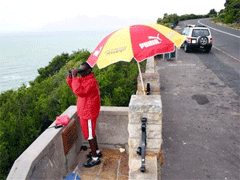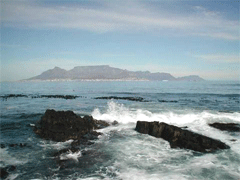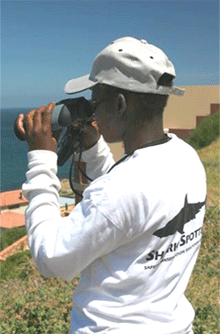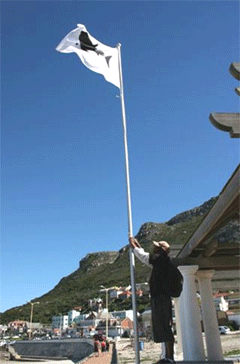South Africa Shark Spotters
Air Date: Week of July 4, 2008

Sharkspotter (Photo: Shark Spotters)
Great white sharks are found throughout the world, prompting many beach communities to set up special nets to protect swimmers and surfers. But Cape Town, South Africa is taking a different approach. They’ve set up a system of shark spotters who are on the lookout and sound an alarm when danger lurks in the water. Producer Terry FitzPatrick explains how it works.
Transcript
GELLERMAN: They’re out there, lurking in the deep, hungry, waiting.
[MUSIC FROM “JAWS” THE MOVIE]
GELLERMAN: Actually, sharks aren’t all that dangerous. According to the International Shark attack file, there were just 62 confirmed , unprovoked shark attacks on people in all of 2006. In fact, in the United States, you’re three times more likely to be fatally attacked by an alligator than a shark and 37 times more likely to die from a snake bite.
Still, you don’t want to have a close encounter with a great white in the deep blue, so beaches where sharks share the water with swimmers are trying out new ways to protect people. In Cape Town, South Africa they’ve created a network of “spotters” who sound an alarm when danger lurks below.
Reporter, Terry Fitzpatrick, lived to tell the tale.
[OCEAN SOUNDS]
FITZPATRICK: If you’re swimming along Cape Town’s ocean beach, this is a sound you do not want to hear.

Cape Town's clean, temperate waters support seals, rays, dolphins, penguins, whales—and more than 250 great white sharks that prey on them. This is Cape Town as seen from Robben Island. (Photo: Terry FitzPatrick)
[THREE BLASTS OF HORN]
FITZPATRICK: This is just a test. But about 50 times a year this horn--and an even louder siren-- signal an actual alarm. It means a great white shark is swimming toward shore.
[THREE BLASTS OF HORN]
FITZPATRICK: Yvonne Kamp of the Cape Town shark spotter patrol says the warnings work.
KAMP: It really just takes a few minutes. That siren goes and everybody knows the drill. The shark spotters also walk up and down and blow whistle and wave hands, you know whatever it takes to get the last people out of the water.
[BEACH SOUND FADES DOWN MOUNTAIN ROAD SOUND FADES UP WITH WALKIE-TALKIE SOUND]
FITZPATRICK: The shark spotters are a team of 20 specially trained lookouts, funded by the city of Cape Town, the World Wildlife Fund and local surf shops. Their work begins not on the beach, but in the mountains high above shoreline.

(Photo: Shark Spotters)
PROVINS: Muizenberg beach watch from Muizenberg mountain watch.
FITZPATRICK: Here, Tracey Provins peers at the ocean using high-power binoculars.
PROVINS: Visibility is about ten percent. I’ve got about 20 surfers and ten bathers, copy.
FITZPATRICK: Provins says a great white shark is hard to miss. They can grow up to 20 feet long.
PROVINS: It’s a dark shadow. Most of the time, they don’t come up. If they come up, we’ll just see the fin.
FITZPATRICK: Provins uses a walkie-talkie radio to warn the beaches below. She tracks everything in the water because wherever there’s prey, predators follow.

From mountain lookouts, Shark Spotters peer at the coastline for tell-tale shadows or fins in the water below. (Photo: Shark Spotters)
FITZPATRICK: Great white sharks are a particular problem in Cape Town. At least 250 of them come to feed at a seal colony that lives on an island close to shore.
Marine biologist Alison Kock at the University of Cape Town has been using underwater radio beacons to study the sharks.
[TAPPING TRANSMITTERS]
FITZPATRICK: The beacons look like thick grey pencils with fishhooks at the end.
[TAPPING TRANSMITTERS]
KOCK: And what we have here is an acoustic monitor. And what these do is they work in conjunction with a transmitter, which we tag the sharks with. So when we get up close and personal with the sharks, we try and attach these transmitters to them. And this transmitter sends out a unique code.
FITZPATRICK: Kock’s research reveals that sharks stay away from shore when there are newborn pups to eat at the seal colony. But at this time of year, sharks rove closer to the beach in search of other prey. She says great whites are not man-eaters by nature. But they are inquisitive.
KOCK: White sharks are particularly confident, curious animals. They’re really interested in people. And for the most part they don’t do anything. They swim by, they have a look, they swim by, and they carry on swimming.
FITZPATRICK: But with more than 100 teeth, even a curious nibble from a great white can maim or kill a person. Cape Town’s shark spotter program began three years ago after a series of attacks. There were calls to cull the shark population. But great whites are an endangered species, and Kock says killing them would upset the region’s balance of marine wildlife.

Shark Spotters fly flags and sound sirens at key beaches to warn swimmers and surfers about the presence of great white sharks. (Photo: Shark Spotters)
[MARINA COMPRESSOR SOUND FADES OUT, BEACH AMBIENCE FADES UP]
FITZPATRICK: Shark spotter Yvonne Kamp says safety nets were ruled out for Cape Town because sharks, dolphins, turtles, penguins and whales get tangled in them and die. She says her network of warning stations is a healthy compromise.
KAMP: When people’s lives are threatened, everyone’s really keen on keeping the people safe and not so worried about the sharks. What we’re trying to do is find a balance, where we’re keeping people safe, but we’re also not harming the ocean.
FITZPATRICK: Many surfers and swimmers support this approach.
WOMAN: People should leave the water first before taking out any sharks. You know, it’s their world and they should be left alone.
MAN: I think the sharks have just as much right to be in the water as we have, and they are entitled to be there.
WOMAN: I think if they wanted to attack people there would be more attacks, because there are a lot out there. So basically, you take your chances. (laughs)

(Photo: Shark Spotters)
FITZPATRICK: The shark-spotting program does more than safeguard the beach. Yvonne Kamp says it increases awareness about the role sharks play in the marine ecosystem. And it provides jobs.
KAMP: The shark-spotting program is primarily a safety program, but it's also creating opportunities for people, like the shark spotters. A lot of them of them were unemployed. So there’s a lot of other spin-offs from the program besides the safety of the people in the water.
[WALKIE-TALKIE CHATTER “I just need a situation, please give me your situation, please.”]
FITZPATRICK: The spotting team seems to be beating the odds. According to Shark Attack File, a group that tracks incidents worldwide, roughly 90 shark bites are reported each year. On average, six people are killed. But since the spotters began protecting ten popular beaches, they haven’t had a single shark attack.
[WALKIE-TALKIE CHATTER “Okay, can I get the situation please.”]
FITZPATRICK: For Living on Earth, I’m Terry Fitzpatrick in Cape Town.
[BEACH SOUND FADES OUT]
Links
Living on Earth wants to hear from you!
Living on Earth
62 Calef Highway, Suite 212
Lee, NH 03861
Telephone: 617-287-4121
E-mail: comments@loe.org
Newsletter [Click here]
Donate to Living on Earth!
Living on Earth is an independent media program and relies entirely on contributions from listeners and institutions supporting public service. Please donate now to preserve an independent environmental voice.
NewsletterLiving on Earth offers a weekly delivery of the show's rundown to your mailbox. Sign up for our newsletter today!
 Sailors For The Sea: Be the change you want to sea.
Sailors For The Sea: Be the change you want to sea.
 The Grantham Foundation for the Protection of the Environment: Committed to protecting and improving the health of the global environment.
The Grantham Foundation for the Protection of the Environment: Committed to protecting and improving the health of the global environment.
 Contribute to Living on Earth and receive, as our gift to you, an archival print of one of Mark Seth Lender's extraordinary wildlife photographs. Follow the link to see Mark's current collection of photographs.
Contribute to Living on Earth and receive, as our gift to you, an archival print of one of Mark Seth Lender's extraordinary wildlife photographs. Follow the link to see Mark's current collection of photographs.
 Buy a signed copy of Mark Seth Lender's book Smeagull the Seagull & support Living on Earth
Buy a signed copy of Mark Seth Lender's book Smeagull the Seagull & support Living on Earth

